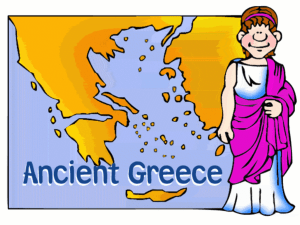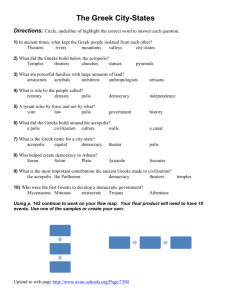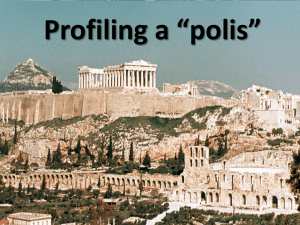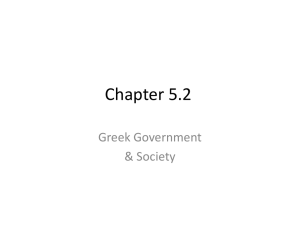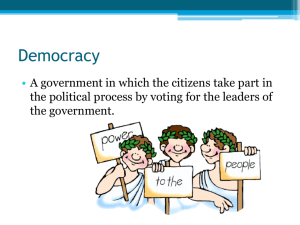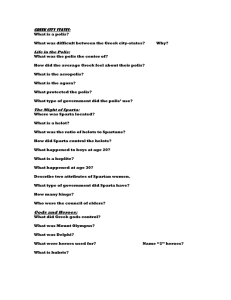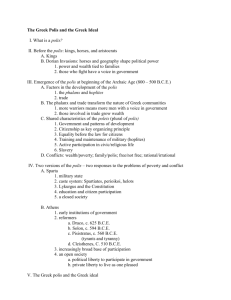Greece - City-States and Political Changes
advertisement
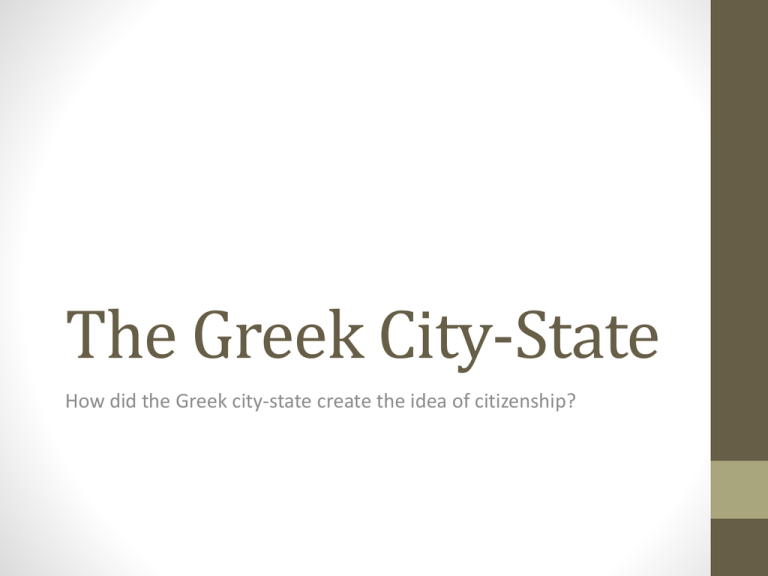
The Greek City-State How did the Greek city-state create the idea of citizenship? Recap from Last Week • Mountains and seas separated Greek communities from each other, so people developed a loyalty to the community in which they lived. • Communities became very independent. • There was a period of decline, and it was called the Dark Age. Greek City-States • By the end of the Dark Age, nobles who owned large estates had overthrown the Greek kings. • These nobles ruled city-states. • Just like in Mesopotamia, the Greek city-states were made up of a town or city and the surrounding area. • Each city-state, or polis (PAH luhs), was like an independent country. What Did a Polis Look Like? • The polis was the basic political unit of Greek civilization. • At the center of each polis was a fort built on an acropolis, or hilltop. • Not only did the Greeks build temples to honor local gods on the acropolis, they also would take refuge in the acropolis when invaders attacked. Acropolis of Athens, a noted polis of classical Greece What Did a Polis Look Like? • The open area outside the acropolis was called an agora. • The agora was a space that served many purposes. • Marketplace • Gathering place for: debating issues, choosing officials, passing laws, and carrying out business Reproduction of an Athenian Agora What Did a Polis Look Like? • City neighborhoods surrounded the agora. • Just beyond the city were villages and farmland that also were part of the polis. Reproduction of an Ancient Greek Polis What Did a Polis Look Like? • Given that most city-states were surrounded by mountains and seas, they were usually small. • Some only covered a few square miles in area, while others covered hundreds of square miles. Reproduction of an ancient Greek polis made out of Legos Citizenship • Today, in the United States, a person who is born here is considered a citizen. • We owe many of our ideas about citizenship to the Greeks. Who Was a Greek Citizen? • Citizens were members of a political community with rights and responsibilities. • Male citizens had the right to vote, hold public office, own property, and defend themselves in court. • In return, male citizens had the responsibility to serve in government and to fight for their polis as citizen soldiers. Ancient Greek citizenship was MUCH different than citizenship in ancient Mesopotamia or Egypt, where citizens had no rights, no voice in government, and no choice but to obey their rulers. Who Was a Greek Citizen? • In most Greek city-states, only free, land-owning men born in the polis could be citizens. • They believed the responsibility to run the city-state was theirs because the polis was made up of their property. • Some city-states later ended the requirement of owning land for a person to be a citizen. • Women and children might qualify for citizenship, but they had none of the rights that went with it. Citizen Soldiers • In Greece, wars were fought by wealthy nobles riding horses and driving chariots. • By 700 B.C., citizens called hoplites (HAHP lyts) made up the city-state armies. • Hoplites fought on foot and were heavily armed. Each one carried a round shield, a short sword, and a spear. • During battle the hoplites marched in rows, shoulder to shoulder. This formation is called a phalanx (FAY langks). Citizens of Greek Poleis • The polis gave Greek citizens a sense of belonging. • They were not unified as a whole country. • This is similar to how people feel about their home states today. • This lack of unity weakened Greece, making it easier to conquer. • The Greek citizens put the needs of the polis about their own. • The strong loyalty to their own city-state divided the Greeks. Political Changes • As Greek city-states grew, wealthy nobles seized power from kings. • The nobles did not rule very long. • Owners of small farms resented the nobles’ power. • The small farm owners had borrowed money from the nobles to buy land, and when they were unable to repay the loans, the nobles often took their land. • The farmers then had to work for the nobles, move to the city to find jobs, or in some cases, they even had to sell themselves into slavery. Political Changes • By 650 B.C., small farmers wanted political change and a greater voice in government. • Merchants and artisans also wanted reform. • The merchants and artisans were not considered citizens because they did not own land. • This meant that they had no role in ruling the polis. Tyrants Take Over • The growing unrest led to the rise of tyrants, people who seize power and rule with total authority. • Most tyrants who commanded city-states ruled fairly. • The hoplites and the common people of Greece supported the tyrants when they overthrew the nobles. • Tyrants strengthened their popularity by building new temples, fortresses, and marketplaces. • Nevertheless, most Greeks objected to rule by a single person. • They wanted a government in which all citizens could participate. What Happened? • Tyrants ruled many of the Greek city-states until about 500 B.C. • From 500 B.C. until 336 B.C., most city-states developed into either oligarchies or democracies. • Oligarchies – a few wealthy people hold power over the larger group of citizens • Democracy – all citizens share in running the government Review 1. What were the rights and responsibilities of the ancient Greek citizens? 2. Why were the tyrants able to hold power in various Greek city-states? 3. Describe what a polis looked like. Use words such as acropolis, agora, etc.
